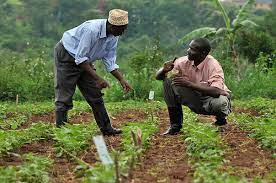Some agriculture experts have urged local farmers to adhere to weather forecasts before starting farming activities to prevent losses due to the effects of climate change.
The experts made the call in separate interviews on Monday in Lagos.
They noted that adherence to traditional farming systems was not helpful given the current realities of climate change.
Agriculture analyst, Mr Omotunde Banjoko, said local farmers should seek information from the Nigerian Meteorological Agency (NiMet) before starting farming activities.
“At least with the few rains we have witnessed recently, it is a good time to start the planting season.
“NIMET, earlier this year, advised that part of the country would experience late rains, while the rains would stop earlier than usual in other parts of the country.
“I urge local farmers to plan according to NIMET’s predictions. It is high time we started paying attention to weather forecasts in Nigeria,” the expert said.
Banjoko restated the need to adhere to weather forecasts to prevent losses.
“Climate change is so real, we cannot say we are isolated from other parts of the world. We cannot say the rains are consistent but we can say the rains have started.
“We cannot follow traditional farming conventions in the wake of climate change. We need to pay more attention to weather forecasts because the patterns are changing.
“Farmers will have to replace those seeds planted earlier because some of them may not survive. To avoid incurring additional cost, farmers should listen to available information,” he said.
To an agriculture consultant and co-founder, of Corporate Farmers International, Mr Akin Alabi, information and investment in irrigation remain essential in today’s agricultural practice.
“Traditionally, farming season starts in March but we had delay till May. As it is, we are not even sure if the rains will be consistent.
“Farmers have to be very watchful in terms of getting information from NiMET to understand weather forecasts and rain patterns.
“This guides farmers, from time to time, on when they can begin their farming season officially,” he said.
Speaking on investments, Akin said they needed to invest in automated irrigation systems: “It can even be a sprinkler but farmers need water on their farms because of the effects of climate change.
“Farmers also need to invest in alternative energy such as solar energy to power the irrigation systems. These are primary investments that farmers need to make in the face of inconsistent weather patterns.
“If individual farmers cannot afford these, they can form cooperatives to aid the cultivation process.”
Despite the delay in the commencement of the farming season, Mr Uche Ikenga, a crop farmer, said his peers were hopeful of bountiful harvests.
“We have begun the planting season, the commencement of the rains is an encouragement to us.
“We urge farmers to put in their best efforts because of what hunger has done to us so far.
“Farmers should take their business seriously. The delay may affect this year’s harvest because, as it is, we have only two planting cycles left in the year.
“Except for those that have facilities for dry season farming, we just have two cycles left,” Ikenga said.
NAN


